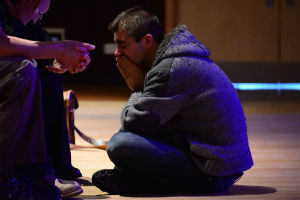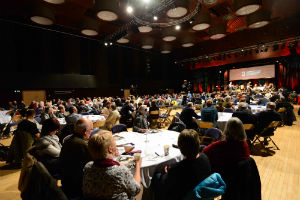
At the last count, there are three churches in membership of
both BUGB and BUS, and a slightly larger (if unrecorded) number of ministers who for historical or pastoral reasons hold dual accreditation; I am one such minister serving one such church. One implication of this is that I am entitled to attend the Assemblies each Union holds in association with BMS World Mission. It is fair to say that over the years I have attended them, the character of the Assemblies as changed, and continues to change, as each Union endeavours to "forge its future" (if I may borrow from the title of this year's Assembly in Scotland). It may be interesting for readers outwith the BUS to learn something about Assembly, not least because I suspect it may have something to offer the Associations by way of regional gatherings.
The Baptist Union of Scotland currently comprises 168 churches, and around 70 per cent of those sent delegates to this year's Assembly. With free registration for retired people, and free admission to evening sessions, there were up to 500 people present in the main, plenary, sessions (so that would be equivalent to something like 5000 in BUGB-BMS terms!).
The first year I attended Assembly in Scotland it was rather dry and formal, with endless receiving of reports of committees; now although Assembly includes the necessary AGM business, this has been streamlined so that most reports are received en bloc. Increasingly it has a 'jamboree' character with big-name speakers and high energy worship. A small seminar programme is offered directly connected to the Assembly theme; and a small exhibition space is offered to various baptist and Christian organisations.
This year a creative experiment was undertaken with a full day of facilitated round table discussions on the subject of 'making missionary disciples'. As delegates arrived they were allocated to tables of 8-10 and were expected to return to those groups throughout the day to share the exploration. As a group facilitator I found the experiment both interesting and inadequate! It was a brave and exciting idea but it was very over-ambitious. Sets of three questions at a time, with roughly ten minutes to discuss and answer them, and then text the responses to a single mobile phone had inevitable consequences, in my view.

A lot of the responses were merely restatements of key phrases that had occurred in the earlier plenary sessions - notably to 'keep bad company' with no consideration of what that meant or might entail. The technology employed wasn't up to the job - some poor person literally had to transcribe hundreds of text messages by hand into a computer! I am told that in one group there was no discussion as everyone simply texted in their own answers. What will happen now is of course the key question - unless resources can be committed to collating, analysing, interpreting and implementing the findings, the exercise has little long term value. For all its limitations, and my own scepticism about its efficacy in a lived response, it was a good experience, and one with potential to be developed further.
One sadness about the BUS-BMS Assembly is the total absence of discussion around public issues. Whilst the set-piece motions so often used at BUGB-BMS Assembly are far from ideal, and whilst I doubt most people think about mosquito alarms, human trafficking, or whatever it might be after the vote, at least there is a sense that we are part of society and that as 'salt and light' we have a responsibility to engage with these issues. Given the referendum on Scotland's future governance next year, it would have been good to think beyond party politics and simplistic responses to the part that we, as Baptist Christians, want to play in shaping that future. Next year is too late to start thinking about it - it feels like an opportunity missed.
It is not the case that one model of Assembly is intrinsically 'better' than another, for each emerges within its own culture and context. I really value the fact that a greater proportion of Scottish churches have people at Assembly than in BUGB-land and the fact that the smaller actual numbers permit such experiments as the one undertaken this year. I also value the opportunity the Assembly in BUGB-land gives me to catch up with college friends (I am the only minister in Scotland who trained where I did!) and to think about real life issues beyond the walls of church. As BUGB assemblies change their style and focus the possibility of Association level Assemblies drawing insights from the Scottish model might be worth considering.